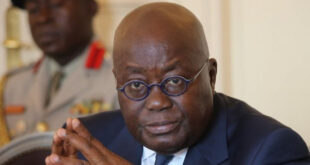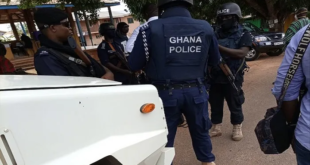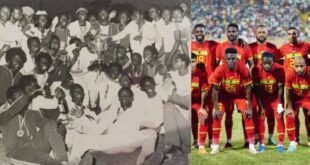In less than 24 hours, the International Tribunal for the Law of the Sea (ITLOS) will settle the disagreement between Ghana and Cote d’Ivoire over an area where Ghana is currently undertaking oil exploitation.
The arbitration process started in late 2014 after Ghana dragged Cote d’Ivoire to the ITLOS, the judiciary arm of the United Nations (UN) Convention on the Law of the Sea, over claims by Ivory Coast that parts of the oil and gas-rich Cape Three Points, off the shores of the Western Region, belonged to it.
Ghana took the landmark decision to head to the Tribunal after it had failed to resolve the matter through diplomatic discussions with its French-speaking neighbor.
The demands by both countries are at sharp variance – both countries want a declaration with each unwilling to make a concession.

Ghana is asking the Chamber to state that Ivory Coast has for years agreed that the area in dispute belongs to Ghana.
Attorney-General, Gloria Akuffo, told the Chamber in her wrap up earlier this month that Ivory Coast was barred from demanding ownership to the disputed area off the Cape Three Points because the French-speaking country had for many decades acknowledged that Ghana owned the space.

“Ghana respectfully requests the special chamber to adjudge and declare that Ghana and Cote d’Ivoire have mutually recognised, agreed and applied an equidistance-based maritime boundary the territory sea EEZ and continental shelf within 200 miles.
“In accordance with international law, by reason of its representations and upon which Ghana has placed reliance, Cote d’Ivoire is stopped from objecting to the agreed maritime boundary,” Gloria Akuffo said in her closing remarks.

Gloria Akufo
The Ivorian delegation, on the other hand, sees this request as strange.
They consider the exploitation in the area as an affront to their rights.
“The activities undertaken by Ghana unilaterally in the Ivorian maritime area, constitutes a violation of firstly the exclusively sovereign rights of Cote d’Ivoire over its continental shelf,” the Ivorian representative, Adama Toungara, said.
He also wants the Chamber to ask the two nations to meet and decide what is due Cote D’Ivoire, but the Ghana Delegation will not acquiesce.
Cost
The Public Interest and Accountability Committee (PIAC) Annual Report for 2016, released in June this year, said there was a 56% increase in the amount of money spent contesting the Maritime Boundary Dispute with Ivory Coast at the ITLOS.
The expenditure rose from $1.81 million in 2015 to $2.83 million in 2016, the report said.
Final hours
Meanwhile, the Daily Graphic has reported that Gloria Akuffo is already in Hamburg, Germany with a Ghanaian delegation, to witness the delivery of judgement.
Officials from the Ministry of Energy, the Attorney-General’s Department, the Maritime Boundary Secretariat, the Ghana National Petroleum Corporation (GNPC) and other state agencies that made an input into the hearing of the case are also in Hamburg to observe proceedings.
The Ivorian team, the Daily Graphic gathered, was expected in Hamburg on September 21 and 22, 2017.
Graphic Online’s Mabel Aku Baneseh reports from Hamburg that officials from both countries are tightlipped on their expectations but a Ghanaian source said “we hope for the best from the tribunal.”
Timeline of events
2007: Ghana discovers oil and gas in commercial quantities. Cote d’Ivoire stakes claim of ownership to portions of the West Cape Three Points.
2010: Cote d’Ivoire renews claim of ownership of the disputed sea, days after Vanco, an oil exploration and production company, announced the discovery of oil in the Dzata-1 deepwater-well.
2010: Ivorian government petitions the United Nations asking for a completion of the demarcation of its maritime boundary with Ghana.
March 2010: Ghanaian authorities responded with the setting up of the Ghana Boundary Commission (GBC) tasked with the responsibility of negotiating with Côte d’Ivoire towards finding a lasting solution to the problem.
September 2014: Ghana drags Cote d’Ivoire to ITLOS after 10 failed negotiations.
April 2015: ITLOS makes first ruling, places moratorium on new projects and asks old projects to continue.
2017: Case concluded and judgement given.
Source: Ghana | Myjoyonline.com
 Radio1Ghana Serving Communities
Radio1Ghana Serving Communities










